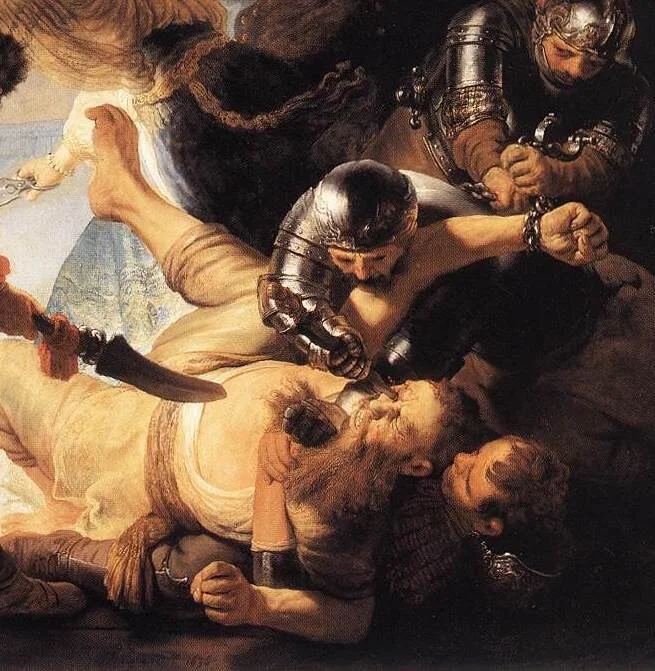“What should I give up for Lent?” is a question many of us ask at the beginning of Lent. Fr Jonathan Jong thinks through this question in a reflection on Luke 4.1-13, medieval penitentials, and the Church Fathers’ thoughts about abstinence and almsgiving.
All tagged lent
On being perfect
We start off this penitential season, appropriately enough, with a meditation by Fr Stephen Hearn about Jesus’s injunction in Matthew 5 to be perfect.
Poetry and Lent: During Wind and Rain (Thomas Hardy)
I first came across this poem many years ago. I’ve never been a devotee of Hardy. As an undergraduate I tackled Tess of the d’Urbervilles; I found it utterly compulsive, emotionally exhausting, but slightly mechanical—at every key moment in the story, Tess has a decision to make, and after a while you get the idea that she’s not going to make the right one.
Poetry and Lent: Descending Theology (Mary Karr)
Mary Karr writes that ‘Poetry and prayer alike offer . . . [an] instantaneous connection—one person groping from a dark place to meet with another in an instant that strikes fire’. Poetry is akin to prayer, perhaps a form of prayer, as it turns us outward. Language itself does this, moving us beyond ourselves to connect with another. […]
Poetry and Lent: To whom it may concern (Adrian Mitchell), Some (Daniel Berrigan)
Lent is a good time to think about the nature of truth. During Lent, we prepare ourselves for our celebration of the Resurrection, the ultimate victory of truth over the deceit of evil. The Resurrection is the truth upon which we as Christians base our lives. […]
When does Lent begin and end?
The observance of a period of fasting before Easter is very ancient, though the length and character of the fast varied from place to place in the early days. Writing in the 2nd and 3rd centuries, Irenaeus of Lyons and Tertullian in North Africa both mention preparatory fasts in the days leading up to Easter. By the 4th and 5th centuries, we see the fasting period elongated: both Athanasius’s and Cyril’s Festal Letters assume a 40 day fast, for example. There are, however, still debates over what counts as this “fast of forty days”…
Lent Series: Judges -- Jepthath
This is a hard text. Jephthah was an illegitimate child of Gilead, and ostracised from his family and lived away from the people. But he was a valiant warrior, and Israel was in trouble. So the elders of Gilead went to Jephthah and asked him to lead them. He does so reluctantly, and leads Israel into battle against the Ammonites who were coming against them. Going into battle, he makes a vow to God that if he has victory and returns safely home the first thing that comes out of his house he will consecrate to God and make of it a burnt offering. [...]
Lent Series: Judges -- Delilah
Deborah; Gideon; Samson; and Jephthah next week: the stories of the judges of pre-monarchic Israel are tales of sex and death, violence and debauchery. The judges themselves are morally ambiguous and not irregularly foolish, which is putting things kindly in some cases. Delilah is, of course, not a judge. It is not clear what she is, except to say that without her, Samson would hardly have a story. She is unmistakably the active participant in their relationship, driving the narrative forward with admittedly gender stereotyped activities [...]
Lent Series: Judges -- Samson
In comparison with the other Old Testament Judges, it’s easy not to take Samson very seriously. He is no military leader and hardly a willing deliverer of Israel. Instead he is a brawny, brawling, amoral adventurer. A swaggering, audacious Lothario with a penchant for Philistine women. [...]
Lent Series: Judges -- Gideon
Which of you, intending to build an out-house, does not first sit down and estimate the cost, to see whether he has enough to complete it? Well, of course. Prudence is a very British virtue. And which of you, if you were sent down to a riverbank to drink, wouldn’t kneel, and make a cup of your hands, and lift them to your mouth? Well, of course. Decorum is a very British thing, too. [...]
Lent Series: Judges -- Deborah
The Book of Judges describes a period long in Israel’s past, which acts as a bridge between the narratives of Exodus and the conquest and settlement of Canaan on the one hand, and the history of the monarchies of ancient Israel and Judah on the other. There are twelve characters in the book who, we are told, judged Israel, most of whose names we would not now recall, but a few of whom – Deborah, Gideon, Samson, Jephthah – live more easily in our memories because of the stories and songs associated with them. [...]










